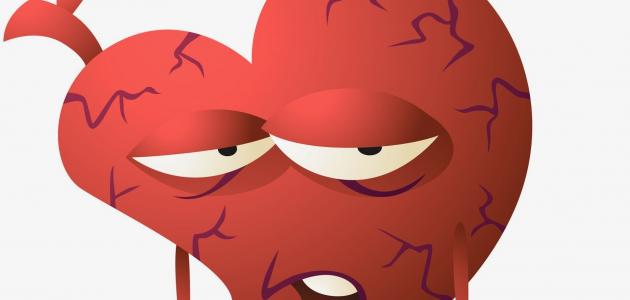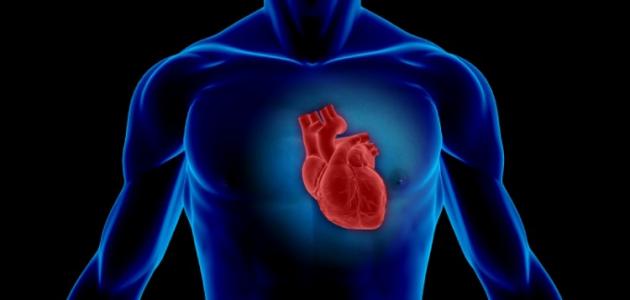Contents
Heart-shaking
Heart flutter, or what is known scientifically as atrial flutter , is one of the types of cardiac arrhythmias , which is the presence of a rapid but regular heartbeat as a result of a problem in the heart's electrical system, and in fact atrial flutter is similar to a common heart rhythm disorder known as fibrillation Atrial fibrillation , but the heartbeat is more regular in patients with atrial flutter compared to patients with atrial fibrillation, and sometimes the patient suffers from separate and alternating periods of flutter and atrial fibrillation. [1]
It should be noted that a normal individual can feel a flutter similar to the flutter of butterflies inside the chest for a second or two seconds, as a result of anxiety or tension associated with ending a hard work, or watching a horror movie, while it is considered abnormal that the feeling of heart flutter continues for 30 seconds or more. Or the emergence of other symptoms that warrant concern and see a doctor to conduct the necessary medical examinations for the heart and blood vessels, and among these symptoms; Dizziness, light head, shortness of breath , increased sweating, chest pain , [2] and heart palpitations or a feeling of strong pulse, fatigue, exhaustion, fainting , and jamming vision, [3] chest tightness, low blood pressure, and certainly blows the heart rate fast, [ 4]The two main types of atrial flutter are: The acute atrial flutter that appears for a short period of time and then disappears, and the atrial flutter that lasts for several days or weeks. [5]
Causes of heart palpitations
The heart normally sends electrical signals that start from the sinus node located in the right atrium, and then travel to the left atrium, so that these upper chambers pump blood to the lower chambers. They are the left and right ventricles, and the electrical signal temporarily stabilizes in the atrioventricular node to allow the ventricles to fill with blood, then the signal continues on its way to the ventricles to pump blood to the whole body, and the normal heart rate during rest ranges between 60-100 beats per minute, [4] but In the case of atrial flutter, an electrical circuit is often observed inside the right atrium, and the electrical signal rotates around it repeatedly in a specific and distinct path, [6]This leads to rapid contractions of the atrium, reaching about 300 beats per minute, and in fact the atrioventricular node cannot deliver electrical signals at this speed, but it transmits almost half of it to the ventricles, bringing the beating speed of the ventricles to 150 beats per minute, [4] ] The cause of the atrial flutter problem is the following: [5]
- Heart diseases and problems: These include the following:
- The blood supply to the heart is cut off as a result of coronary heart disease, atherosclerosis , or blood clots.
- Arterial hypertension.
- Cardiomyopathy.
- Dysfunction of the heart valves, especially the mitral valve.
- An enlarged heart chamber.
- Undergo an open heart surgery.
- Physical diseases and ailments affecting the heart: including the following:
- Hyperparathyroidism.
- Pulmonary embolism as a result of a clot reaching the blood vessels of the lung.
- Chronic obstructive pulmonary disease that reduces the amount of oxygen in the blood.
- Consume substances that affect the method of conducting cardiac electrical signals: These include the following:
- Alcohol.
- Cocaine.
- Some weight-loss medications.
- Some cold medicines.
- Caffeine .
Heart heart risk factors
There are a group of factors that make some individuals more likely than others to develop atrial flutter, the most important of which are the following: [6] [7]
- Smoking .
- Heart disease.
- Previous heart attack.
- Infection with high blood pressure or some lung diseases.
- Exposure to stress, stress and anxiety.
- Take some medications.
- Having diabetes.
- Undergo surgery in the last short period.
- Obesity .
- Suffering from sleep apnea.
- For sick sinus syndrome.
- Pericarditis or endocarditis.
- Hyperthyroidism.
Complications of heart murmurs
Heart arrhythmia due to atrial flutter is considered a serious problem that requires medical intervention, due to the ease of health complications resulting from the health status of the heart, [3] although some patients with atrial flutter do not feel any associated symptoms, but it can cause this problem. Health complications such as; Stroke, heart failure, [1] and acceleration of the heartbeat that leads to insufficient blood supply to the body's organs, low blood pressure, and thromboembolism, that is, blockage of vessels due to the formation of blood clots, and cardiomyopathy, [3] and in fact it often worsens Atrial flutter problem progressing to chronic atrial fibrillation. [6]
Heart-heart treatment
The goals of treatment are to control the heart rate, restore the normal heart rhythm, prevent the recurrence of the problem later, and prevent the occurrence of stroke, and this is done by conducting appropriate medical intervention for the disease in the hospital, with the need for the patient to adhere to the prescribed medications from the doctor after discharge from the hospital Here are some of the most important treatments for atrial flutter. [8]
Pharmacological treatments
Choosing the right medication depends on several factors, the most important of which are; The number of times the flutter occurs, the real reason behind the problem, the health status of the injured person, and other medications he takes. In general, atrial flutter medications are divided into the following categories: [8]
- Medicines to control stroke rate: These are essential medications. They help reduce the speed of the heartbeat to ensure blood is pumped more effectively, and include digoxin , and beta blockers such as; Metoprolol, Atenolol , and calcium channel blockers such as; Diltiazem .
- Heart rhythm control drugs : These drugs control rapid electrical signals in an attempt to reach normal heart rhythms, the most important of which are sodium channel blockers and Potassium channel blockers .
- Anticoagulant drugs: These drugs reduce the ability of the blood to clot , thus reducing the possibility of heart and cerebral strokes, examples of which are: Warfarin and Rivaroxaban .
Medical procedures
It includes the following procedures: [8]
- Cardioversion by electric shock: The process of cardioversion by electric shock is performed by completely anesthetizing the patient, then connecting electrodes to the chest area and sometimes on the back, then giving the patient's body an electric shock that helps restore rhythm. Cardiac status is normal, and the patient usually returns home the same day.
- Ablation radial wave: tracking method ablation ultrasound radial method ablation catheter attack ; Where the doctor uses a thin, flexible tube to enter it from a blood vessel in the groin or neck area, and directs its path until it reaches the heart, then radiation waves are sent aimed at destroying the cells that cause arrhythmias, thus restoring the normal rhythm.
References
- ^ A b Mayo , Clinic Staff (15-7-2017), "Atrial Flutter" , Www.mayoclinic.org , Retrieved 18-2-2019. Edited.
- ↑ "WHAT ARE THOSE BUTTERFLIES IN YOUR CHEST?" , www.virtua.org , 19-6-2017, Retrieved 18-2-2019. Edited.
- ^ A b v the Charles , Patrick Davis , (27-3-2018), "Atrial Flutter the Symptoms, Causes, of ECG, And Treatments" , Www.medicinenet.com , Retrieved 18-2-2019. Edited.
- ^ A b T. Joseph Bennington (21-7-2016), "What ' Is Atrial Flutter?" , Www.everydayhealth.com , Retrieved 18-2-2019. Edited.
- ^ A b , Noel G Boyle (10-1-2019), "Atrial Flutter" , Www.emedicinehealth.com , Retrieved 18-2-2019. Edited.
- ^ A b v by Richard N Fogoros (7-11-2018), "What ' The Post Are the Symptoms Of Atrial Flutter?" , Www.verywellhealth.com , Retrieved 18-2-2019. Edited.
- ↑ The Healthline Editorial Team (23-3-2017), "Atrial Flutter" , www.healthline.com , Retrieved 2-18-2019. Edited.
- ^ A b v . James Beckerman (14-5-2018), "Atrial Flutter" , the www.webmd.com , Retrieved 18-2-2019. Edited.
















